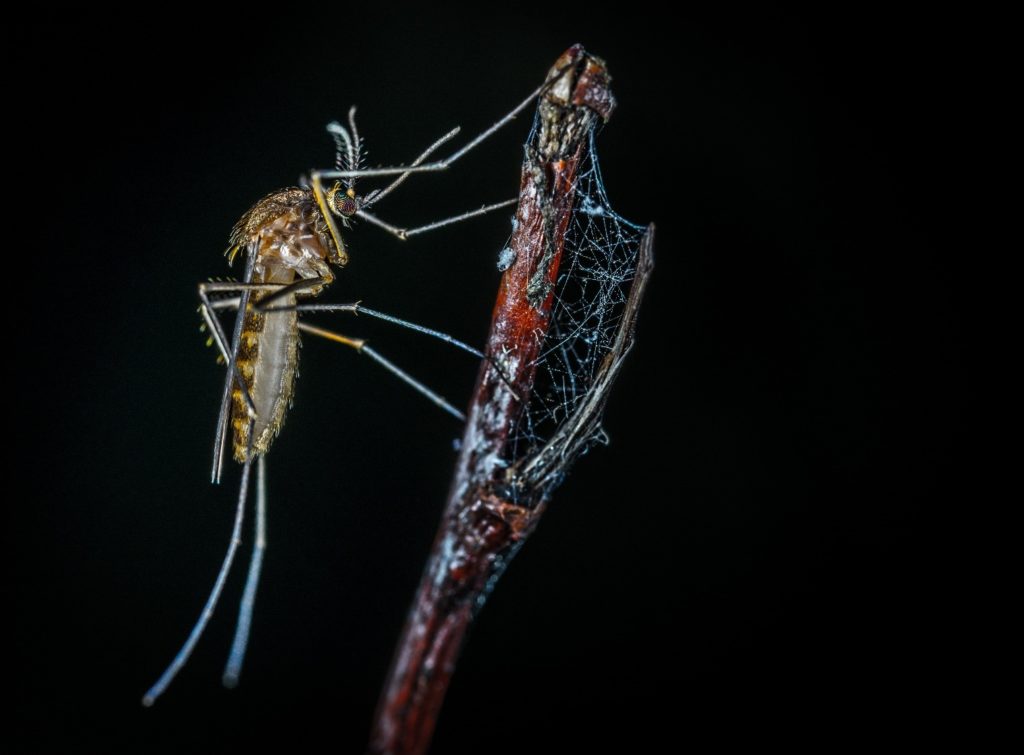
I learned this today. Mosquitoes come out at dusk and are active throughout the night because the temperature is lower than during the day, it is easier to find food, and there are fewer predators around.
It is not true to say that all mosquitoes come out at night. There are more than 3,000 species of mosquito in the world and it goes without saying that they don’t all keep the same hours. However, one thing that can be said is that almost all mosquitoes avoid the hot midday sun. Because mosquitoes are small, they dehydrate very easily when they come into contact with hot sunlight. Generally, they hide during the hottest part of the day. Owing to the need to avoid sunlight, it is very easy to get bitten if you are walking through a forest, or somewhere that is cool and shaded.
Mosquitoes are cold blooded and they switch off and hibernate if the temperature drops below 10℃. They become really active when it is at 26℃ and then they become less active as the temperature rises and the strength of the sunlight increases. Mosquitoes will bite you if you disturb them when they are hiding, but they won’t follow you back out into direct sunlight. They are most active in the morning as the day is warming up and in the dusk when it is cooling down. Animals that are active in the dawn and dusk are called crepuscular animals.
It is also easier for them to find food at these times. Different mosquitoes seek out different kinds of food. Culiseta melanura, the black-tailed mosquito, sucks the blood of passerine birds. Some feed on mammals, some feed on reptiles, and many other animals. Nearly all of these animals are either asleep or less active throughout the night. It is much easier for the mosquito to find and drink blood if its prey is not moving around.
There are also fewer predators around in the dawn and dusk hours. Many things eat mosquitoes. Birds, bats, fish, frogs, turtles, dragonflies, and spiders. The mosquito hopes to avoid all of these by being active in the dawn and dusk. Birds are probably the largest predators of mosquitoes because mosquitoes are extremely easy to catch. Mosquitoes are not very good at flying because they have a very small range of motion in their wings. They don’t get as much lift as other insects and have to beat their wings four times as fast. That explains the whining-buzzing sound they make when they fly around your ear. They flap their wings 720 times a second!
Mosquitoes have to hide if the sunlight gets too high, but they actually use heat as a way of detecting their prey. An experiment was run where mosquitoes were put in a box with heated plates at different temperatures. The mosquitoes gathered around the plate that was 40℃ because this is the body temperature of the birds that they prey on.
Mosquitoes also use carbon dioxide and something called mushroom alcohol to find their prey. All animals exhale carbon dioxide, which makes it an excellent way to track animals. Mosquitoes fly around randomly until they detect carbon dioxide and then they follow it until they find the animal.
Mushroom alcohol is also known as octenol. It is a chemical that is produced by several plants and fungi. It is common in edible mushrooms, hence its name. It is also contained in human breath and sweat. Mosquitoes have a detector for this and they can home in on it. Some people produce far more of it than others.
Mosquitoes are generally active in the dawn and dusk, but if one of them gets stuck in your house they could be active all day long. The house will usually shield them from the strong sunshine, which means they don’t have to hide. And the pleasant temperature and lights will keep them going for much longer.
Mosquitoes are known for spreading diseases. Obviously, malaria is the most common disease. Malaria is estimated to kill hundreds of thousands of people every year. Many people would like to wipe mosquitoes out, but they are a vital link in the food chain. It would be impossible to get rid of all mosquitoes without harming the animals that feed on mosquitoes and then the animals that feed on those animals. A far better way is to stop the mosquitoes from spreading diseases. We will still get bitten, but that is something we can put up with. Current research is working on mosquito gene therapy. Malaria is caused by the parasite plasmodium that some species of mosquito carry in their guts. The genetically modified mosquitoes would release antimicrobial molecules after they have drunk blood, and those molecules would kill the parasite. And this is what I learned today.
Photo by Egor Kamelev https://www.pexels.com/ja-jp/photo/760086/
Sources:
https://off.com/en/education/insects-101/how-mosquitoes-find-you
https://qz.com/943245/mosquitoes-are-actually-terrible-at-flying/
https://www.orkin.com/pests/mosquitoes/what-eats-mosquitoes
https://www.terminix.com/mosquitoes/facts/when-are-mosquitoes-active/
https://www.mosquitomagnet.com/articles/when-are-mosquitoes-most-active
https://blog.mosquito.buzz/how-weather-affects-mosquito-activity
https://www.sciencedaily.com/releases/2015/12/151215091403.htm
https://mosquitonix.com/blogs/news/what-time-of-day-are-mosquitos-most-active
https://en.wikipedia.org/wiki/1-Octen-3-ol
https://en.wikipedia.org/wiki/Mosquito
https://www.imperial.ac.uk/news/219394/simple-genetic-modification-aims-stop-mosquitoes/
